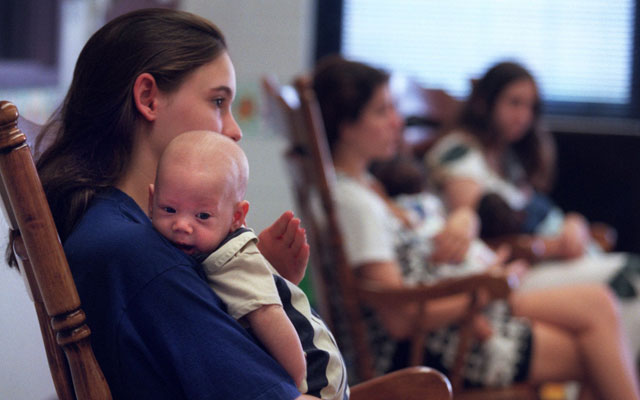NYC Teen Pregnancy Ads Should Focus on Why Marriage Matters
Rachel Sheffield /
New York City has a new ad campaign to prevent teen pregnancy, which has stirred up quite the controversy.
Featuring faces of distraught babies, the ads feature captions such as, “I’m twice as likely not to graduate high school because you had me as a teen,” and “Honestly Mom, chances are he won’t stay with you. What happens to me?”
The left has (unsurprisingly) criticized the campaign for being judgmental. Planned Parenthood complained that the campaign “creates stigma, hostility and negative public opinions about teen pregnancy and parenthood rather than offering alternative aspirations for young people,” and says that NYC should instead use its money to focus on “helping teens access health care, birth control and high-quality sexual and reproductive health education.” (Never mind that New York City has been handing out taxpayer-funded birth control and abortion-inducing drugs to high school students.)
Some conservatives, however, have also expressed concerns that the ads could encourage abortion in the city that already leads the nation in abortion rates.
The Big Apple could take a better approach to its ad campaign by voicing a position on what really matters on this issue—marriage. To their credit, one of the ads does a good job at hitting this theme. It reads: “If you finish high school, get a job, and get married before having children, you have a 98% chance of not being in poverty.” Good start. Marriage should come up in every ad.
Why? Because the majority of births to single women are connected to the breakdown of marriage relationships between young men and women—generally among the low-income, but increasingly more so among those in working class communities. In reality, most unwed births are to women in their twenties, not to teens. Only 8 percent of births to single moms are to high school–age girls, while roughly 75 percent are to women between 18 and 29.
Today, over 40 percent of births are to single women. This is devastating. Not only are children in single-parent homes more than five times as likely to be poor, but they are also at greater risk of dropping out of high school, engaging in delinquent behaviors, and having a child outside marriage themselves. Not surprisingly, single-parent families also make up the vast majority of families with children on welfare.
It’s time to get the message out that marriage matters. Robert Rector of The Heritage Foundation notes that there has been a “pervasive social silence” on this issue:
Young people in low-income communities are never told that having a child outside of marriage will have negative consequences. They are never told that marriage has beneficial effects. The schools, the welfare system, the health care system, public authorities, and the media all remain scrupulously silent on the subject.
Here’s the good news: many single mothers value marriage. The problem is that it’s difficult for them to achieve this dream. Many come from communities where the traditional sequence of “first comes marriage, then comes baby” has been reversed, to the detriment of their achieving stable marriages and steady financial futures.
New York City “should next launch a public campaign about the value of marriage to adults, children and society,” said Ron Haskins of the Brookings Institution. He continues:
There will be at least as many critics of this message as the message that young people should avoid teen pregnancy. Good. The bigger the controversy, the more the media will cover the debate, and the more the nation will have the opportunity to reflect on what is at stake.
The stakes are high for not only for New York City but for cities and states nationwide. It’s time to stop the “pervasive silence” and start talking about why marriage matters.

